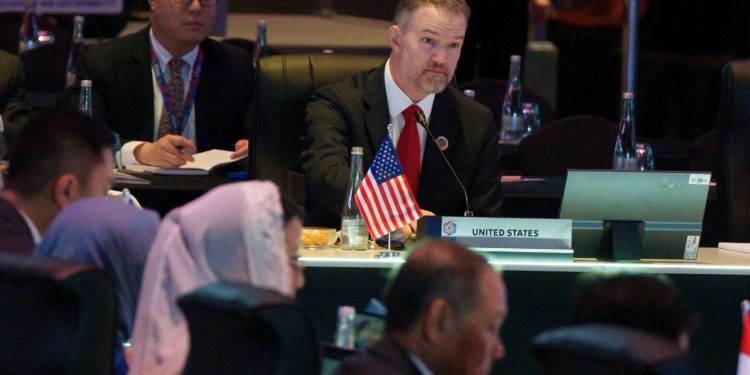WASHINGTON (AP) — China likes to condemn the United States for extending its arm too far beyond its borders to impose demands on non-American companies. But when it sought to retaliate against U.S. interests this month, Beijing did exactly the same thing.
By expanding rare earth export rules, Beijing announced for the first time that it would do so. require foreign companies to obtain approval of the Chinese government to export magnets containing even a tiny quantity of rare earths of Chinese origin or produced with Chinese technology.
That means a South Korean smartphone maker must seek permission from Beijing to sell the devices to Australia if the phones contain rare earths of Chinese origin, said Jamieson Greer, the U.S. trade representative. “This rule gives China control of almost the entire global economy in the technology supply chain,” he said.
To anyone familiar with U.S. trade practices, China is simply borrowing a decades-old U.S. policy: the direct foreign goods rule. It extends the reach of U.S. law to products manufactured abroad and has been routinely used to restrict China’s access to certain U.S. technologies manufactured outside the United States, even when they are in the hands of foreign companies.
It’s the latest example of Beijing looking to U.S. precedents for the tools it needs to confront Washington in what appears to be conflict. prolonged trade war between the two largest economies in the world.
“China is learning from the best,” said Neil Thomas, a Chinese policy researcher at the Center for China Analysis at the Asia Society Policy Institute. “Beijing is copying Washington’s model because it has seen for itself to what extent American export controls could limit its own economic development and political choices. »
He added: “The game recognizes the game.”
The idea dates back to at least 2018
It was in 2018, when President Donald Trump launched a trade war with China, that Beijing felt the urgency to adopt a set of laws and policies that it could easily deploy when new trade conflicts arise. And he looked to Washington for ideas.
Its Unreliable Entity List, established in 2020 by China’s Ministry of Commerce, resembles the U.S. Commerce Department’s “entity list” that prohibits certain foreign companies from doing business with the United States.
In 2021, Beijing passed the Anti-Foreign Sanctions Law, allowing agencies such as China’s Foreign Ministry to deny visas and freeze the assets of undesirable people and companies – similar to what the US State Department and US Treasury Department can do.
Calling it a toolkit against foreign sanctions, intervention and long-arm jurisdiction, the official China News agency cited ancient Chinese teaching in a 2021 report, saying Beijing would “retaliate with the enemy’s methods.”
The law “scanned relevant foreign laws and took into consideration international law and the basic principles of international relations,” Chinese academic Li Qingming was quoted as saying in the report. He also said it could deter the other side from escalating tensions.
Other formal measures adopted by Beijing in recent years include expanding export controls and foreign investment review tools.
Jeremy Daum, a senior law fellow and senior fellow at the Paul Tsai China Center at Yale Law School, said Beijing often draws on foreign models to develop its laws in non-commercial, non-foreign-related areas. While China seeks to be able to retaliate in kind through trade and sanctions, the tools are often “very parallel” to those of the United States, he said.
The two governments also adopted a “holistic view of national security,” which broadens the concept to justify mutual restrictions, Daum said.
Things have accelerated this year
When Trump launched his trade war with China shortly after returning to the White House earlier this year, Beijing immediately deployed its new tools in addition to raising tariffs to match those imposed by the US president.
In February, in response to Trump’s initial 10% tariffs on China over allegations that Beijing had failed to curb the flow of chemicals used to make fentanyl, China’s Commerce Ministry put PVH Groupwhich owns Calvin Klein and Tommy Hilfiger as well as the biotechnology company Illumina, on the list of unreliable entities.
This has prevented them from engaging in China-related import or export activities and making new investments in the country. Beijing also announced export controls on tungsten, tellurium, bismuth, molybdenum and indium, which are essential elements for the production of modern high-tech products.
In March, when Trump imposed the second 10% tariff, linked to fentanyl, Beijing placed 10 other American companies on its Unreliable Entity List and added 15 U.S. companies to its export control list, including aerospace and defense firms like General Dynamics Land Systems and General Atomics Aeronautical Systems, among others, saying they “endanger China’s security and national interests.”
Then came the so-called “Liberation Day” tariffs in April, when Beijing not only matched Trump’s exorbitant 125 percent tariffs, but also blacklisted more U.S. companies and announced export controls on more rare earth minerals. This led to a pause in the shipment of magnets needed to make a wide range of products such as smartphones, electric vehicles, jets and missiles.
Although the new tools have allowed China to hold the United States in contempt, Daum said they are not without risks.
“The dangers of such a fair and seemingly balanced approach are, on the one hand, what one party sees as reciprocity, the other might interpret as escalation,” he said. And second, “in a race to the bottom, no one wins.”









